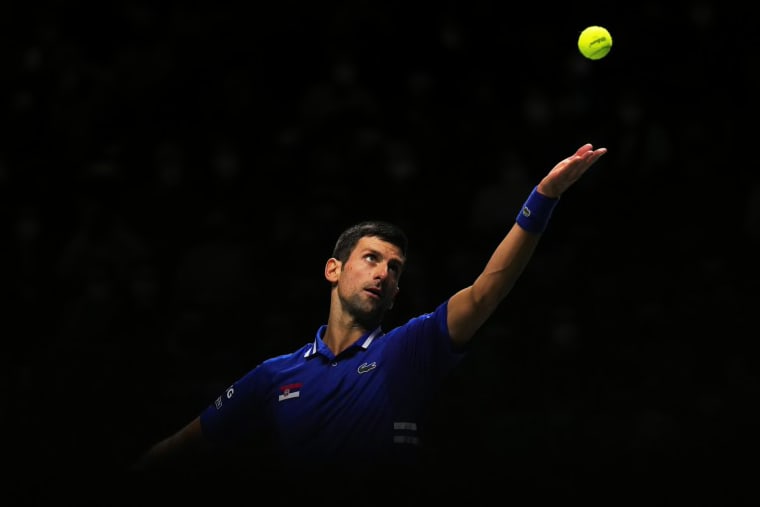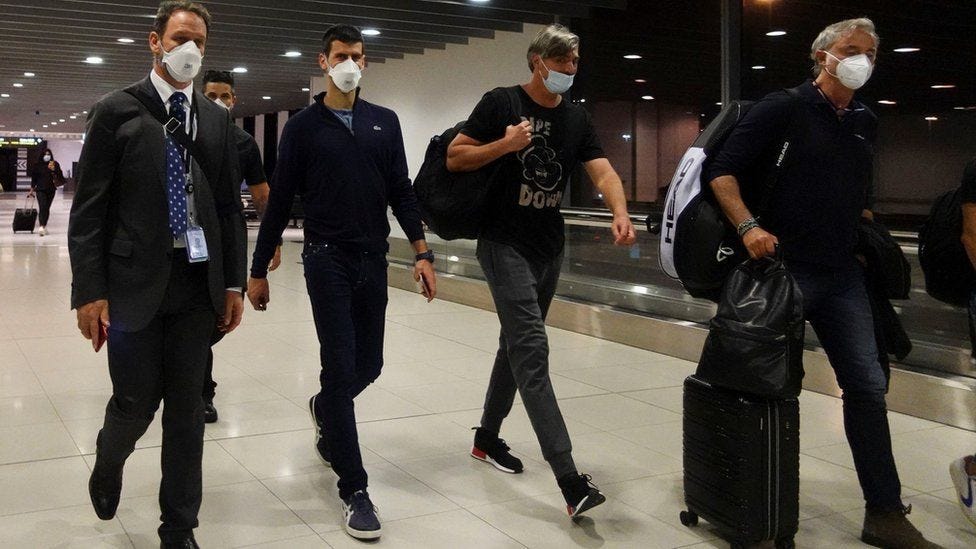The Djokovic Saga: Another Example of Australian Authoritarianism at Work
Sonia Hickey: Sydney Criminal Lawyers Blog.
Unless you’ve been living under a rock, you’ll be well aware that Novak Djokovic lost his fight to stay in Australia and compete in the Australian Open, and has now left the country.
Initial application
Mr Djokovic’s initial application before the Federal Court of Australia against Australian Immigration Minister Alex Hawke resulted in consent orders being agreed between the parties, effectively allowing the number one ranked tennis player in the world to remain in the country.
The Minister had opposed the application on the basis that the tennis star had not met the requirements for entering the country, despite having obtained a medical exemption for COVID-19 from Tennis Australia’s chief medical officer, which had been signed off on by two medical experts, a valid visa and valid entry permit into Victoria.
During those proceedings, presiding judge Judge Anthony Kelly remarked: “What more could this man have done?”.
Immigration minister changes tack
Shortly thereafter, Mr Hawke conceded that Mr Djokovic had fulfilled the requirements for entry into Australia, going so far as to publicly state that the tennis player is a person of good character.
At the same time, the Minister saw fit to invoke his power under section 133(c) of the Migration Act 1958 (Cth) to cancel Mr Djokovic’s visa “on health and good order grounds, and on the basis it was in the public interest to do so”.
Mr Djokovic is not a criminal and poses no direct threat whatsoever to Australian society. Rather, the (tenuous) basis for the Minister’s decision was essentially that the unvaccinated player could cause disharmony and unrest in the community by bolstering anti-vaccination sentiment.
It was a decision based on speculation, made against a man who has always spoken highly of Australia and who, as ATP Player Council President in 2020, not only organised the donation of A$725,000 to help with Australia’s bushfire relief effort, but donated a further A$25,000 of his own money for the same cause.
Indeed, many believe our country should embrace such a person; someone whose presence in Australia is of great benefit both in terms of economics and our status as a nation that hosts some of the best events and sportspeople in the world.
The decision has been seen by many as arrogant grandstanding by our government, and could have longer term adverse consequences for our nation.

The case against Djokovic
Mr Djokovic’s legal team then made an application for review of the decision to a full three-judge bench of the Federal Court, who unanimously refused the application.
The judges made clear the ruling was not based on the merits of the case, but on procedural grounds in that it confirmed the Minister had the broad power to cancel a visa if he came to the view it was against the interests of the country to have the person here.
Convicted of an alleged thought crime
Once the court’s judgment was published, the sentiment that Mr Djokovic had been convicted of a ‘thought crime’ went viral on social media.
As Djokovic’s lawyers pointed out, the Government’s arguments only presumed the tennis player was of anti-vax sentiment, rather than actually providing crucial evidence to prove this is indeed the case.
The Government’s arguments about the effect Djokovic’s presence might have while in Australia, or what his personal views about vaccination may be, was enough for the court. The threshold for real evidence was exceptionally low, and this is largely because of the broad sweeping powers that the Immigration Minister is afforded under the Migration Act 1958.
The Migration Act gives the minister broad discretionary powers to decide whether to grant a Visas, revoke Visas, enable residency or require an ‘unlawful non-citizen’ to remain in held detention.
These powers were originally included in the Act for the purpose of Australia facing a real threat — a violent terrorist, for example.
Dictator-like powers
But to date, these powers have only attracted controversy. Former Immigration Minister Peter Dutton found himself embroiled in a scandal in 2018 provoked by leaked emails which suggested that he had gone out of his way to personally grant visas to two ‘au pairs’.
The following year, he was also heavily criticised for not exercising his powers under the Act to enable the Murugappan family, from Biloela, to stay in Australia.
Current Immigration Minister Alex Hawke granted the family temporary visas after the youngest daughter Tharnicaa suffered a serious illness last year.
This meant the family could leave Christmas Island where they had been held in detention since 2019 but they remain, for the foreseeable future, in ‘community detention’ in Perth.
There is still no certainty around the family’s future, and their legal battle with the Federal Government is ongoing.
It has cost taxpayers tens of millions of dollars – in detention costs and legal fees. As has been said several times before, it could all be resolved quite easily and quickly, at the stroke of the Immigration Minister’s pen.
Similarly, Djokovic’s detention and court case has also cost Australian taxpayers money. And a considerable amount of international embarrassment, particularly in light of the fact that Djokovic won the first challenge in the Federal Court against his deportation.
Concerningly, after that, the Government changed the game. Djokovic’s assumed beliefs and possible influence as a sporting role model were put on trial.




